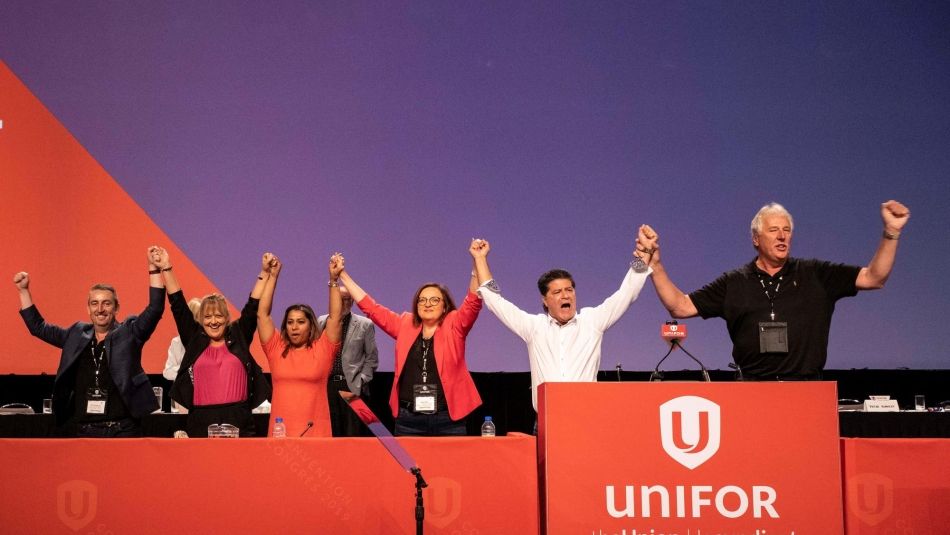
Share
Delegates to the third Unifor Constitutional Convention committed to pushing back against the rise of right-wing populists by taking an active role in elections, at the bargaining table, in organizing drives and in the fight for gender equity.
“We will always spend a lot of time talking about politics because it affects our lives each and every day,” said Unifor National President Jerry Dias in his closing address to the convention, held in Quebec City.
Delegates adopted a new Political Action Program and released Unifor’s plans for the coming federal election, including a dedicated website and an aggressive advertising campaign.
“We’re going to get involved in the tough debates. We’re going to stick our nose in the political arena,” Dias said.
Social media will be a big part of Unifor’s election effort, which got a big boost at Convention with a Twitter storm of delegates posting selfies with signs reading “I am voting to stop Scheer.”
Both Prime Minister Justin Trudeau and Foreign Affairs Minister Chrystia Freeland spoke to the convention, stressing the vital role unions play in social justice and building the middle class – especially in the face of increasing right-wing populism.
Dias was acclaimed to his third and final term as President. Lana Payne became Unifor’s first female Secretary-Treasurer. Renaud Gagné was elected at Quebec Regional Council and was acclaimed by the membership as one of the top three officers of Unifor.
Replacing Payne as Atlantic Regional Director is Linda MacNeil. Gavin McGarrigle was chosen as Western Regjonal Director, replacing Joie Warnock, who is now an Assistant to the National President and will lead Unifor’s efforts on Indigenous issues. Naureen Rizvi, former Toronto Area Director and Director of Telecommunications, will continue as Ontario Regional Director.
A tribute was held for Bob Orr, who retired as secretary-treasurer after 35 years of union activism.
Delegates adopted several resolutions, including supporting greater rights for migrant workers, a call to ensure a faster start to contract talks for new bargaining units and an increase in financial and volunteer support for LGBTQ refugees.
Constitutional amendments included increased representation for retirees on Local union executives at former CEP Locals, an increase in strike pay and provisions to give equity seeking groups a stronger voice.
Thousands of delegates rallied outside the Bell Canada building in Quebec City demanding that the phone company maintain good jobs in Canada’s telecommunications industry, and not outsource the jobs of tomorrow.
The same political climate that is fueling Unifor’s political action plan is also behind a new bargaining strategy adopted at the convention to ensure the rights of workers are not only protected, but expanded.
Similarly, a new Organizing Strategic Plan was launched at Convention. The rise of the right and the growing number of Conservative governments in Canada puts unorganized workers most at risk, and Unifor is committed to bringing more workers into the union.
Just weeks after Jason Kenney’s election in Alberta, for example, Unifor successfully organized a hotel in Calgary. In the face of a government attacking their rights, including making organizing more difficult, workers at the hotel voted overwhelmingly to join Unifor, Organizing Director Kellie Scanlan said.
Throughout the week, gender equity was the focus of much of the discussion, from the work of women hockey players fighting for pay equity to a moving address to delegates by Me Too founder Tarana Burke.
“Diversity is being invited to the dance. Inclusion is being asked to dance,” said Tarana Burke, who founded the Me Too movement long before it came known as a hashtag.
A Wednesday night fundraiser sponsored by Unifor raised $150,000 for local women’s shelters.


